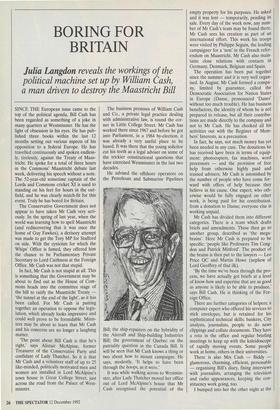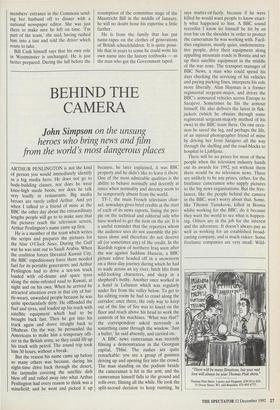BORING FOR BRITAIN
Julia Langdon reveals the workings of the political machine set up by William Cash, a man driven to destroy the Maastricht Bill
SINCE THE European issue came to the top of the political agenda, Bill Cash has been regarded as something of a joke in many quarters at Westminster. He has the light of obsession in his eyes. He has pub- lished three books within the last 12 months setting out various aspects of his opposition to a federal Europe. He has travelled continuously and spoken endless- ly, tirelessly, against the Treaty of Maas- tricht. He spoke for a total of three hours in the Commons' Maastricht debate last week, delivering his speech without a note. The 52-year-old sometime captain of the Lords and Commons cricket XI is used to standing on his feet for hours in the out- field, and he was clearly match-fit for this event. Truly he has bored for Britain.
The Conservative Government does not appear to have taken Mr Cash very seri- ously. In the spring of last year, when the world was learning how to spell Maastricht (and rediscovering that it was once the home of Guy Fawkes), a derisory attempt was made to get the Tory MP for Stafford on side. With the cynicism for which the Whips' Office is famed, they offered him the chance to be Parliamentary Private Secretary to Lord Caithness at the Foreign Office. Mr Cash was not that stupid.
In fact, Mr Cash is not stupid at all. This is something that the Government may be about to find out as the House of Com- mons heads into the committee stage of the bill to ratify the Maastricht Treaty 'the tunnel at the end of the light', as it has been called. For Mr Cash is putting together an operation to oppose the legis- lation, which already looks impressive and could well prove to be formidable. Minis- ters may be about to learn that Mr Cash and his concerns are no longer a laughing matter.
`The point about Bill Cash is that he's right,' says Alistair McAlpine, former Treasurer of the Conservative Party and confidant of Lady Thatcher. So it is that Mr Cash and a volunteer staff of up to 25 like-minded, politically motivated men and women are installed in Lord McAlpine's town house in Great College Street, just across the road from the Palace of West- minster. The business premises of William Cash and Co., a private legal practice dealing with administrative law, is round the cor- ner in Little College Street. Mr Cash has worked there since 1967 and before he got into Parliament, in a 1984 by-election, it was already a very useful place to be based. It was there that the young solicitor cut his teeth as a legal adviser on some of the trickier constitutional questions that have exercised Westminster in the last two decades.
He advised the offshore operators on the Petroleum and Submarine Pipelines Bill; the ship-repairers on the hybridity of the Aircraft and Ship-building Industries Bill; the government of Quebec on the patriality question in the Canada Bill. It will be seen that Mr Cash knows a thing or two about how to mount campaigns. He says, modestly, 'It helps to have been through the hoops, as it were.'
It was while walking across to Westmin- ster, after Lady Thatcher moved her office out of Lord McAlpine's house that Mr Cash recognised the potential of the empty property for his purposes. He asked and it was lent — temporarily, pending its sale. Every day of the week now, any num- ber of Mr Cash's team may be found there. Mr Cash sees his creation as part of an international effort. This week his troops were visited by Philippe Seguin, the leading campaigner for a 'non' in the French refer- endum on Maastricht. Mr Cash also main- tains close relations with contacts in Germany, Denmark, Belgium and Spain.
The operation has been put together since the summer and it is very well organ- ised. In August, Mr Cash formed a compa- ny, limited by guarantee, called the Democratic Association for Nation States in Europe (Danse, pronounced 'Danes' without too much trouble). He has business benefactors, the identity of whom he is not prepared to release, but all their contribu- tions are made directly to the company and not to Mr Cash. He has checked all his activities out with the Register of Mem- bers' Interests, as a precaution.
In fact, he says, not much money has yet been needed in any case. The donations he has received have been in terms of equip- ment: photocopiers, fax machines, word processors — and the provision of free help from otherwise highly paid and trained advisers. Mr Cash is astonished by the number of people who have come for- ward with offers of help because they believe in his cause. One expert, who oth- erwise would be fully engaged on other work, is being paid for his contribution, from a donation to Danse; everyone else is working unpaid.
Mr Cash has divided them into different categories. There is a team which drafts briefs and amendments. These then go to another group, described as 'the mega- brains'. Here Mr Cash is prepared to be specific: 'people like Professors Tim Cong- don and Patrick Minford'. The product of the brains is then put to the lawyers — Leo Price QC and Martin Howe (nephew of Lord Geoffrey of that ilk).
`By the time we've been through the pro- cess, we have actually got briefs at a level of know-how and expertise that are as good as anyone is likely to be able to produce,' says Bill Cash. He is thinking of the For- eign Office.
There are further categories of helpers: a computer expert who offered his services to stick envelopes, but is retained for his sophisticated technical skills; bankers, City analysts, journalists, people to do news clippings and collate documents. They have a rota in the office and regular briefing meetings to keep up with the kaleidoscope of rapidly moving events. Some people work at home, others in their universities.
There is also Mrs Cash — Biddy — glamorous, charming, efficient, personable — organising Bill's diary, fixing interviews with journalists, arranging the television and radio appearances, keeping the con- stituency work going, too.
I bumped into her the other night at the members' entrance in the Commons send- ing her husband off to dinner with a national newspaper editor. She was just there to make sure he left on time. 'I'm part of the team,' she said, having rushed him into a taxi and told the driver which route to take.
Bill Cash himself says that his own role in Westminster is unchanged. He is just better prepared. During the lull before the resumption of the committee stage of the Maastricht Bill in the middle of January, he will no doubt hone his expertise a little further.
He is from the family that has put name-tapes on the clothes of generations of British schoolchildren. It is quite possi- ble that in years to come he could write his own name into the history textbooks — as the man who got the Government taped.



































































 Previous page
Previous page